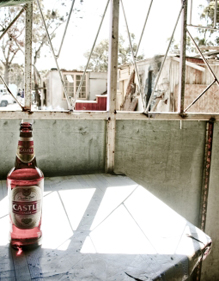|
Getting your Trinity Audio player ready...
|
 Shebeen owners in Pimville, Soweto, have accused SAPS officers from Kliptown police station of corruption. They claim their businesses are raided regularly and that their goods are confiscated – even though they have trading permits.
Shebeen owners in Pimville, Soweto, have accused SAPS officers from Kliptown police station of corruption. They claim their businesses are raided regularly and that their goods are confiscated – even though they have trading permits.
Police officers harass them weekly, the shebeen owners in the area have told Corruption Watch. They often confiscate their goods, whether or not they have a valid permit. And then, when they go to the police station to recover these confiscated goods, there is often no record that their goods were seized.
Sometimes, the shebeen owners add, they have to pay a fine of up to R1 500 to get their goods back – if they get them back at all.
Thato Sedibeng*, a Pimville shebeen owner whose business was raided in August 2011, said police officers who raided their taverns always took off their name tags before doing so, which made it difficult to identify and report them.
“They came to my shebeen once and asked for a permit and I showed it to them,” said Sedibeng. After showing them his permit, one of the officers asked Sedibeng where he sold his liquor. He replied that he ran his business in the garage, where he also lived.
The police officer then asked: “Why are you selling in a garage because that’s where cars park?” Sedibeng explained: “Then I asked him if he hadn’t noticed that in the township, people live in garages. And then he asked me who am I to ask him that. I told him he knows people live in garages because we are poor and then I asked him if he’s ever seen a car in this yard. That’s [when] the fight started.”
Sedibeng added that when the police officers raided his business in August last year, they came with guns and a convoy of cars and a truck, as if they were looking for criminals. “At the same time when you call the police when there’s a problem, they [the police] always tell you there are no vehicles available,” he charged.
“They don’t fight crime. We’ve been complaining about this [criminal] we call ‘One Man’ who breaks into people’s houses at gun point. To this day they still haven’t caught him.”
On the day Sedibeng’s business was raided, the police confiscated two fridges and eight cases of alcohol. He told Corruption Watch that he was arrested and advised to pay an admission of guilt fine instead of going to court. He had to pay a R1 500 fine and a further R300 to the police officer to get his fridges back.
‘They end up taking everything’
“If you let them into your shebeen, they end up taking everything, including money and cellphones,” said another shebeen owner. “They’re busy harassing us and all we’re trying to do is earn a living. Then they take our goods. If they take our goods how are we supposed to feed ourselves?”
The National Tourism and Hospitality Association (NTHA), which represents shebeen owners, confirmed that its members were raided by Kliptown police officers at least once a week. “You’ll find that they [the police] raid someone for no reason and they take their goods,” said the NTHA’s deputy president, Monde Dhladhla.
Dhladhla explained that the group’s members had tried to report this matter to the police, but were afraid of the repercussions.
Shebeen owners were often arrested because of high noise levels and for trading with invalid permits. Sometimes they were arrested because their businesses did not have parking space. In addition, some shebeen owners landed in trouble because they didn’t have consent letters – it was required that eight of their neighbours sign a letter giving them consent to sell liquor, he added.
“They (the Liquor Board) must do away with this consent letter because at the end of the day not all their neighbours will sign [to give them permission to trade],” said Dhladhla.
Because they did not fully know the law, when shebeen owners were arrested they often paid an admission of guilt fine of R1 500. He advised members to ask for bail rather, because that would give them an opportunity to defend themselves in court instead of paying R1 500 for just two cases of beer, for example.
Dhladhla said the NTHA held fortnightly meetings with its members, where they were coached on complying with the Liquor Board regulations. They were also given tips on how to behave when the police came to their businesses. The association also held regular meetings with the Liquor Board.
It was also meant to meet Gauteng Economic Development MEC Qedani Mahlangu to discuss liquor licences. “Sometimes you find that people who are raiding these people’s [businesses] are the reservists. So you will hear stories that they [SAPS] came this week and I gave them something [a bribe] and sometimes others will say ‘They came and took my goods’. But when they go to the station, the liquor is not there.”
Serious allegations
Gauteng provincial police spokesperson Lieutenant-Colonel Lungelo Dlamini explained that reservists who were on duty were regarded as members of the SAPS and were always accompanied by permanent members when they performed any crime prevention duties.
“The allegations of corruption against police are very serious,” said Dlamini. “This office is appealing to shebeen owners to come forward to report or identify officers involved [so that] investigations may be conducted.”
Theft cases may also be opened if their property was unlawfully taken by the police, said Dlamini.
NTHA told Corruption Watch that the Gauteng Liquor Board had informed it that police officers were not allowed to raid shebeens or arrest owners without a board inspector present, although this happened often in Pimville. However, when Corruption Watch spoke directly to the Liquor Board, it denied this.
Cleo Bodibe-Lushaba, the board’s director of education and awareness, explained that police officers were allowed to raid shebeens without a Liquor Board inspector, unless the raid was taking place in the evening.
Dhladhla said the raids in Pimville usually occurred in the evening.
“As policemen, they know how to enforce the law. They don’t have to have an inspector all the time,” said Bodibe-Lushaba. “The police officers are doing a good job and they’re enforcing the Liquor Act.”
She added that often the shebeen owners were in the wrong, citing failure to adhere to legal trading hours as one of the reasons for raids. “Some shebeen owners do not comply with the law completely. Sometimes you’ll find that they don’t sell food and you’re supposed to sell food if you sell alcohol.”
She included selling alcohol to children as one of the many offences shebeen owners committed. “There are also a lot of fake and fraudulent permits.”
When the police confiscated Sedibeng’s goods his permit had expired, but he told Corruption Watch he had been given an extension until 31 June 2012, which allowed him to trade.
Liquor licences needed
According to Dhladhla, NTHA had been trying to get licences for its members since 2011. Shebeen permits are temporary legal documents that have been in use since 2004 and grant shebeen owners the right to trade. However, under the new Liquor Act, which is still being amended, shebeen owners will be expected to have liquor licences in order to operate.
Dhladhla said many shebeen owners didn’t have permits and he had been told by Gauteng Liquor Board officials that permits would be scrapped at the end of June 2012. Shebeen owners would be given three months to apply for licences.
“We applied for them to have permits, but what happened was that the Gauteng Liquor Board changed its chief officer and since the new guy came in, they said we have to wait until these permits expire at the end of June … They told us when the permits expire they’re going to give them [temporary] documents which they can trade with,” added Dhladhla.
Bodibe-Lushaba denied that shebeen owners would be supplied with temporary documents that would allow them to trade in the interim period, saying that when the permits expired at the end of June, they would not be able to trade at all.
At the time of publishing, Corruption Watch had learnt that shebeen owners had been granted a permits extension. MEC Mahlangu had extended shebeen permits by eight months, giving owners until February 2013 to apply for liquor licences.
“We are happy with the MEC’s decision, because we didn’t know what was going to happen when the permits expired and we are hoping in these eight months everyone will have a chance to apply for licences,” said Dhladhla.
Mandla Sidu, spokesperson for the Gauteng Department of Economic Development, told Corruption Watch the decision to grant shebeen permit extensions will give the department the time it needs to migrate shebeen permits into the liquor-licensing system.
“It is also to ensure that the rights of individuals are not adversely affected, that there is no unreasonable burden on anyone, and that permit holders are fully protected and operate within the framework of the law,” the department’s spokesperson said.
He added that the department will, in due course, provide guidelines on how traders will be migrated to the new licence regime.
*Names have been changed to protect the individual’s identity.







